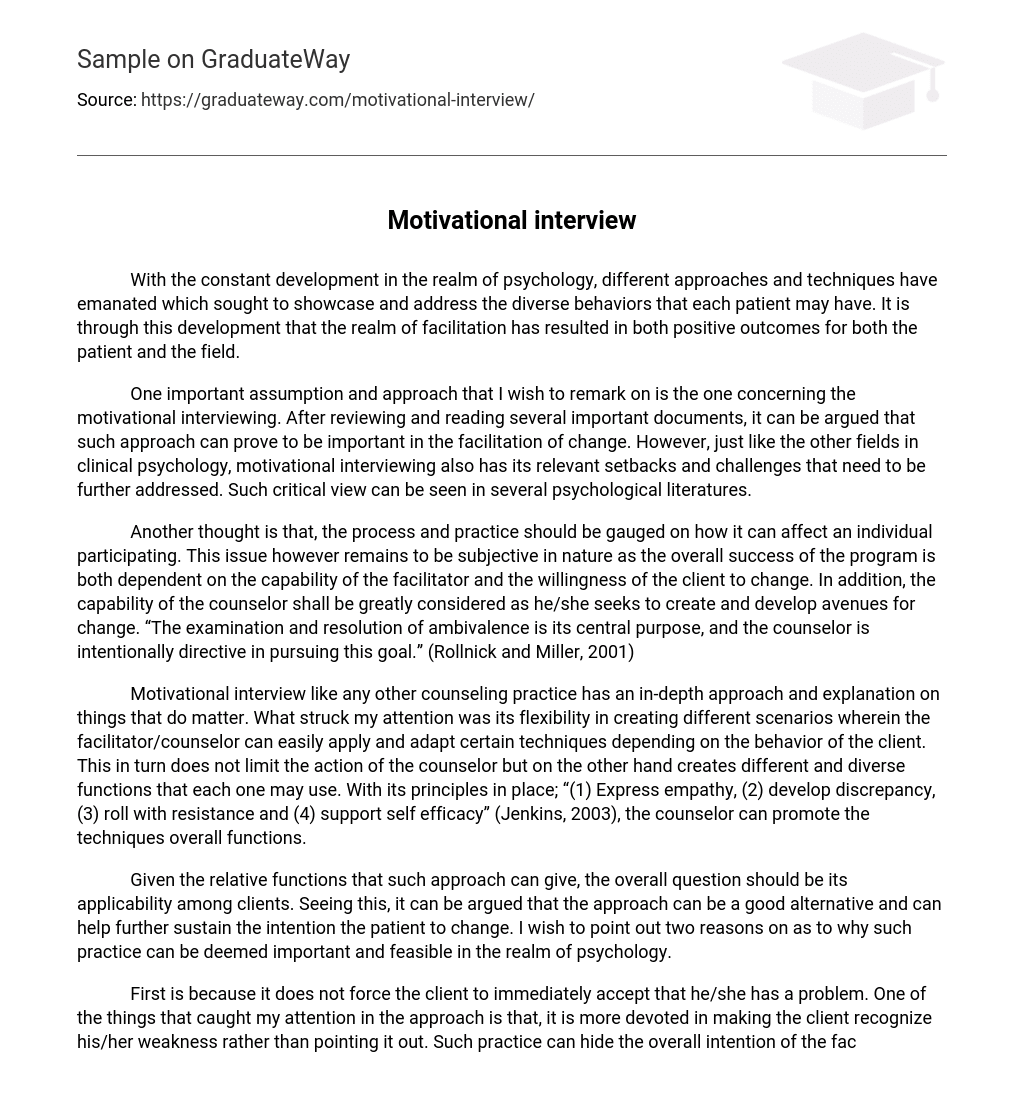With the constant development in the realm of psychology, different approaches and techniques have emanated which sought to showcase and address the diverse behaviors that each patient may have. It is through this development that the realm of facilitation has resulted in both positive outcomes for both the patient and the field.
One important assumption and approach that I wish to remark on is the one concerning the motivational interviewing. After reviewing and reading several important documents, it can be argued that such approach can prove to be important in the facilitation of change. However, just like the other fields in clinical psychology, motivational interviewing also has its relevant setbacks and challenges that need to be further addressed. Such critical view can be seen in several psychological literatures.
Another thought is that, the process and practice should be gauged on how it can affect an individual participating. This issue however remains to be subjective in nature as the overall success of the program is both dependent on the capability of the facilitator and the willingness of the client to change. In addition, the capability of the counselor shall be greatly considered as he/she seeks to create and develop avenues for change. “The examination and resolution of ambivalence is its central purpose, and the counselor is intentionally directive in pursuing this goal.” (Rollnick and Miller, 2001)
Motivational interview like any other counseling practice has an in-depth approach and explanation on things that do matter. What struck my attention was its flexibility in creating different scenarios wherein the facilitator/counselor can easily apply and adapt certain techniques depending on the behavior of the client. This in turn does not limit the action of the counselor but on the other hand creates different and diverse functions that each one may use. With its principles in place; “(1) Express empathy, (2) develop discrepancy, (3) roll with resistance and (4) support self efficacy” (Jenkins, 2003), the counselor can promote the techniques overall functions.
Given the relative functions that such approach can give, the overall question should be its applicability among clients. Seeing this, it can be argued that the approach can be a good alternative and can help further sustain the intention the patient to change. I wish to point out two reasons on as to why such practice can be deemed important and feasible in the realm of psychology.
First is because it does not force the client to immediately accept that he/she has a problem. One of the things that caught my attention in the approach is that, it is more devoted in making the client recognize his/her weakness rather than pointing it out. Such practice can hide the overall intention of the facilitator to inhibit change and at the same time creates avenues for cooperation between the client and counselor.
Second point is that the approach is deeply rooted on the importance of motivating and alleviating ambivalence. Motivation is an important component in the realm of counseling. Creating the dimensions for change can greatly improve the willingness of the client/patient to cooperate fully in the process. With this, there is independence in the way the patient chooses his/her path. The counselor only acts as a motivator and an inspiration that can help lead the way to change. “Clients are free to choose the elements that they believe will be most helpful to them in their efforts.” (Wagner and Conners, 2003)
In the end, after careful study of the approach, motivational interviewing proves to be an important dimension in the realm of clinical psychology. Its facets can help create active environments for patients’ to exhibit changes. All it takes is both a collaborative effort from the client and facilitator. It is through this that the practice can be deemed successful and fruitful.
References
Jenkins, D.E. (2003) Working with Addictive Disorders: A Motivational Interviewing
Perspectives. Retrieved June 4, 2008.
Rollnick, S. and Miller, W.R. (2001) What is MI in Motivational Interviewing. [online]
Retrieved June 4, 2008 from http://motivationalinterview.org/clinical/whatismi.html
Wagner, C. and Conners, W. (2003) The Philosophy Behind Motivational Interviewing in
Motivational Interviewing. [online] Retrieved June 4, 2008 from http://motivationalinterview.org/clinical/philosophy.html





